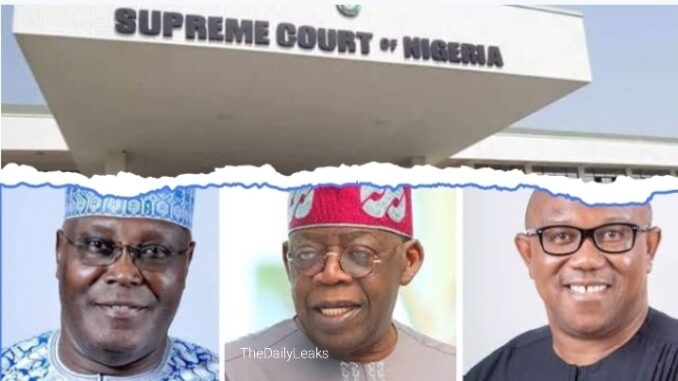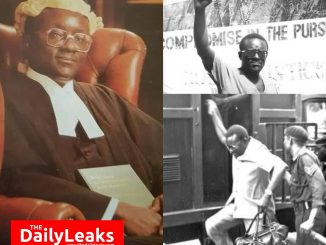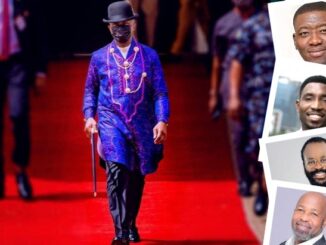
By Gideon Maxwell
Nigeria’s Supreme Court began hearing of the appeals filed by the country’s opposition presidential candidates Atiku Abubakar, and Peter Obi, challenging the judgement of the Presidential Election Petition Court which affirmed President Bola Tinubu’s election victory.
The seven-member Supreme Court panel,bon Monday, October 24, 2023, led by John Okoro, sat to hear the appeals filed by Abubakar of the Peoples Democratic Party, Obi of the Labour Party, and the Allied Peoples Movement (APM) challenging the election of Tinubu of the ruling All Progressives Congress (APC).
Earlier, the Presidential Election Petition Court in Abuja headed by Haruna Tsammani, on Wednesday, September 6, 2023, ruled that Atiku and Obi failed to substantiate their separate claims of widespread electoral malpractices during the conduct of the 25 February presidential election by Nigeria’s electoral commission, the Independent National Electoral Commission (INEC).
Similarly, the court dismissed another petition filed by the APM on the ground that the suit was lacking in merit.
In their arguments, part of the issues raised by the trio included the eligibility of President Tinubu and Vice President Kashim Shettima’s candidacy for the election, plus Tinubu’s inability to secure 25 per cent of valid votes cast in Abuja during the polls.
They contested INEC’s failure to electronically transmit polling unit results to its Results Viewing (IReV) portal in real-time, which they said allegedly amounted into vote manipulation in favour of Tinubu
In today’s hearing, a major bone of contention before the seven-member Supreme Court panel is President Tinubu’s academic records recently obtained from the Chicago State University (CSU) by the PDP’s Atiku Abubakar, and has been placed before the apex court urging it to examine the authenticity of Tinubu’s academic records.
But Tinubu’s lead lawyer, Wole Olanipekun, a Senior Advocate of Nigeria (SAN), arguing in court, said Atiku and Obi’s appeals lack substance and should be thrown out.
Exactly at 9:04 a.m., the seven-member panel of the Supreme Court led by John Okoro resumed into the courtroom. Other members are Uwani Abba-Aji, Lawal Garba, Ibrahim Saulawa, Adamu Jauro, Tijjani Abubakar, and Emmanuel Agim.
They began the matter of the day as the Court registrar called Atiku’s appeal against Tinubu, while, Chris Uche, SAN, announced his appearance for Atiku, and Abubakar Mahmoud, SAN, announces legal representation for Nigeria’s electoral commission, INEC, while Wole Olanipekun, SAN, announced his appearance for Tinubu, and Akin Olujinmi, SAN, announced legal representation for the APC.
Subsequently, Atiku’s counsel, Uche, told the the Court that the appeals were ripe for hearing, noting that there were some pending interlocutory applications, and he moved a motion filed October 6, 2023, and sought five minutes of adumberation of the application.
“We are praying for an order of leave to present fresh evidence on appeal based on the deposition on oath from Chicago State University,” Uche said, informing the Court that the application was predicated on 20 grounds and an affidavit of 20 paragraphs filed on behalf of Atiku.
Uche said upon the receipt of counter-affidavit from Tinubu, APC and INEC, they filed a written address dated October 18, while adopting the application, urged the court to grant their request, saying the issue involving Tinubu’s certificate “is a weighty, grave and constitutional one.”
He urged the Supreme Court to admit the fresh evidence of President Tinubu’s academic records from CSU presented by Atiku, saying, it has a duty to take a look at Tinubu’s records and reach a decision devoid of technicality.
Responding, the presiding judge, Justice Okoro, asked Uche if the Supreme Court should rely on the Electoral Act or the Constitution, and Uche replied, saying, “The issue about Tinubu’s certificate is a constitutional matter which the court should look into.”
A member of the panel, Justice Agim, also asked Uche to explain the nature of Atiku’s fresh documents he wanted to tender before the Supreme Court, and whether the testimony by CSU registrar was conducted in a court, noting that from Uche’s court filing, the testimony by the CSU registrar held in Atiku’s lawyer’s law office in the US.
Justice Agim said the CSU did not issue any letter discrediting Tinubu’s certificate
“We are dealing with a matter that touches on the national unity of Nigeria,” the justice said.
Again, Justice Okoro asked Uche why he wants the Supreme Court to brush aside constitutional provisions and entertain the fresh evidence, and Uche explained that section 233 of the constitution gives the Supreme Court the power to entertain questions about whether a person has been properly elected, and while responding to the issue raised about the CSU proceedings, Uche said, “There is a slight distinction between proceedings in the US and the UK. In the US, that is how court proceedings are done. Tinubu was represented by a US lawyer, but he did not object to the proceedings being held in Atiku’s lawyer’s law office.”
Uche said depositions are more effective than letters from the CSU authorities regarding the authenticity of Tinubu’s academic records.
Justice Okoro, however, said criminal matters have to be proved beyond reasonable doubt. But in this case, there are two conflicting letters from the CSU, one authenticating the president’s certificate and another discrediting it. “Which do we rely on?” He asked.
But Uche referred the court to a letter earlier issued to Michael Enahoro-Ebah, a lawyer, who testified for Atiku against Tinubu at the Presidential Election Petition Court in Abuja.
Getting to his turn, INEC lawyer, Abubakar Mahmoud, asked the Supreme Court to dismiss Atiku’s application seeking to tender Tinubu’s academic records.
Supported by Olanipekun, who is Tinubu’s lawyers, he urged the Supreme Court to “dismiss this very unusual application” seeking to tender fresh evidence against Tinubu, saying, the fresh evidence is not admissible.
Olanipekun also argued that the CSU depositions are dormant until the deponent comes to court and testify, contending that INEC should have been a party at the deposition proceedings in the US.
Olanipekun further said the question of 180 days (the statutory period within which an election petition should be filed and determined) is clear. It is sacrosanct. It cannot be shifted. Therefore, Atiku cannot seek to tender fresh evidence at the Supreme Court.
He wondered where will the Supreme Court “compartmentalise” Atiku’s fresh evidence. “This is an application in wonderland. It has no merit. We urge the court to dismiss. The courts are bound by the law, and the law is to be interpreted as it is,” Olanipekun said.
Representing the APC, Olujinmi addressed the Supreme Court, saying, “This application lacks merit, it is misconceived and we urge the court to dismiss it,” as he adopted Olanipekun’s arguments.
“You cannot smuggle in a document into the Supreme Court without first tendering same at the trial court.”
But Justice Okoro asked, “what do we do with the fresh evidence?” And Olujinmi replying said the burden is on Atiku to prove why the fresh evidence should be admitted by the Supreme Court.
In his response, Uche told Tinubu’s lawyers that the CSU depositions can be used in the Nigerian court, but Olanipekun informed the Court of a motion his team filed on October 7 praying for the striking out of some of the appellants’ grounds of appeal.
Uche said, in opposition, that his team filed a counter-affidavit on October 18, that the counter-affidavit was accompanied by a written address. “We urge the court to dismiss Mr Tinubu’s motion,” he added.
It was after the preambles that the Supreme Court began hearing of substantive appeal in Atiku’s case against Tinubu.
As Uche adopted his court filings in the substantive appeal, urged the court to allow the appeal, and set aside the judgement of Presidential Election Petition Court, saying germane constitutional issues are involved in the appeal, therefore, the Supreme Court should critically examine the appeal.
INEC lawyer, Mahmoud, in his address, prayed the court to dismiss the appeal as it lacks merit, as Olanipekun pointed out the contradictions in Atiku’s prayers, where he prayed the court to disqualify Tinubu as a candidate in the election, and in another breath, called for a rerun to be conducted between him and Tinubu, which threw the courtroom into laughter, after which the court rose for a five-minutes recess.




